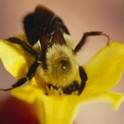It has been historically difficult to manipulate secondary compounds in living plants to assess how these compounds influence plant‐herbivore and plant‐pollinator interactions. Using a hemiparasitic plant that takes up secondary compounds from host plants, I experimentally manipulated secondary compounds in planta and assessed their effects on herbivores and pollinators in the field. Here, I show that the uptake of alkaloids in the annual hemiparasite Castilleja indivisa resulted in decreased herbivory, increased visitation by pollinators, and increased lifetime seed production. These results indicate that resistance traits such as alkaloids can increase plant fitness directly by reducing herbivore attack and indirectly by increasing pollinator visitation to defended plants. Thus, selection for production of secondary compounds may be underestimated by considering only the direct effect of herbivores on plant fitness.
Available at: http://works.bepress.com/lynn_adler/12/
